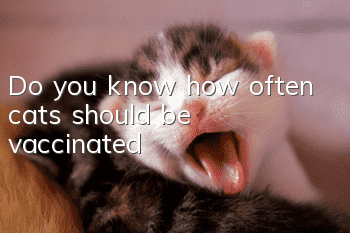Do you know how often cats should be vaccinated?

Generally speaking, vaccines are biological agents that we develop to inoculate animals to produce specific antibodies to the corresponding virus in order to prevent infectious viral diseases. It is basically common sense for us to vaccinate kittens. Cats that are not vaccinated are just like running around naked like computers without anti-virus software. It is not cost-effective and not worth it. Do you know how often to vaccinate cats?
Do you know how often cats should be vaccinated?
For kittens, they need to be vaccinated three times in a row, with an interval of 3-4 weeks between each time. Adult cats with relatively strong immune systems only need to be vaccinated twice. However, it also requires an interval of 3-4 weeks each time.
Can it be advanced or postponed? What are the consequences of each?
Neither advance nor delay is acceptable, as this will affect the effectiveness of the vaccine in producing antibodies and fail to achieve sufficient antibody concentration levels, leading to immune failure.
Vaccination should be given every few years? Why?
Vaccines are usually recommended once a year after basic immunization. Because as time goes by, the antibody concentration level in the body will also decrease over time, and may eventually disappear completely. Therefore, it is necessary to vaccinate once a year to ensure that the body maintains a high concentration of antibody levels at all times.
Now we also advocate that whether to continue vaccination can be judged based on the body's antibody concentration level. To put it simply, we can measure the vaccine antibody concentration level in the body every year. If the concentration is high, we do not need to vaccinate. If the concentration is low, we will vaccinate again.
How old can a kitten be vaccinated?
Under normal circumstances, healthy and normal pet cats can be vaccinated about one week after they are successfully weaned. Of course, if it is a newly bought cat, it is best to take it to the pet hospital for a physical examination before entering the house, and then go home after being vaccinated. During the physical examination, the veterinarian will perform a health check on the kitten, provide a written health certificate, and ask questions about the cat's behavior.
If the parent is buying an adult cat directly, they also need to know whether it has been vaccinated when it was young, whether it often received auxiliary injections during its growth stage, and whether it has a recent health certificate.
The side effects of vaccines sound scary. Is it safer not to take the vaccine?
Vaccine side effects are very rare, especially given the millions of vaccinations currently administered around the world each year. The most common side effects are mild and include drowsiness, loss of appetite, or pain at the injection site, and usually last no longer than 3 days. more seriousSide effects may include vomiting, diarrhea, lameness, fever, symptoms of respiratory infection, or lumps at the injection site.
Observation at the vaccination hospital for 20 to 30 minutes after immunization will help doctors detect allergic reactions in cats in time and take timely measures.
All in all, vaccination is a very safe procedure that can greatly reduce the impact of some serious infectious diseases on your cat. However, no drug can be completely free of side effects. The most important thing is to choose a safe and reliable vaccine, contact the doctor promptly if any abnormalities occur, and solve the problem in a timely manner.
- What does it mean when a cat likes to rub its head against people?
- Can cats drink tea?
- Seven things to note when using anthelmintics for cats, a must-read for novice cat owners!
- Can cats sleep with people?
- What's wrong with my cat's paws being swollen?
- What should I do if my kitten has a lot of eye droppings? First check whether the eyes are injured.
- Cat owners please pay attention to how to train cats not to urinate everywhere!
- Why does a pregnant cat vomit yellow water?
- Turkish Angora cat food taboos
- Will you be punished for keeping a cat in a university dormitory?



